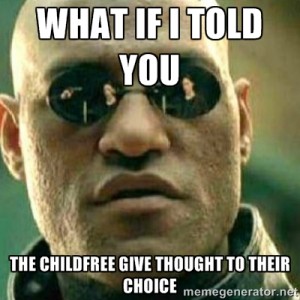 A few months ago, the research finding that many couples who don’t want kids reach the decision “after just one conversation” caught the attention of reporters. Many expressed shock and dismay, calling the decision a “snap choice” and referring to couples’ limited discussion about the matter “strange.”
A few months ago, the research finding that many couples who don’t want kids reach the decision “after just one conversation” caught the attention of reporters. Many expressed shock and dismay, calling the decision a “snap choice” and referring to couples’ limited discussion about the matter “strange.”
Most reports poo-pooed the childfree who participated in the research, noting that the decision not to have kids deserves “further contemplation than whether to have pizza or Indian for dinner.”
Oddly, all of these reports seemed to overlook a crucial point: that the decision not to have kids is one often made by people who think deeply about their choice and then, hopefully, find mates who feel similarly. In my own study of childfree adults, I’ve examined how it is that people come to decide not to have kids.
Childfree? We Know the Why, So What’s the How?
By now, we know well why some people choose not to have kids – concern for the environment, the joy of having greater financial security, the desire for freedom in one’s everyday life, a strong commitment to existing relationships, disinterest in children… the list goes on. What we hear less about is how those of us who don’t want kids reach that decision.
As a sociologist, I study childfree people and I’ve learned that how we decide not to have kids can vary. For a few (just 2 of the 45 I have interviewed thus far), it isn’t really a decision at all — they just know they don’t want them. However for most others, the decision takes time, lots of discussion, and plenty of thought. While stereotypes of the childfree suggest that they are selfish beings who give little thought to their actions, my research shows that this couldn’t be further from the truth.
The childfree participants in my study note that choosing not to have kids is a decision they don’t make lightly. It is both a conscious decision and one that occurs over time.
1. It is a conscious decision.
The overwhelming majority of people I have interviewed say that their decision was well thought out. These people emphasize the deliberate nature of their choice not to have kids by comparing their decision to that of people who do opt to become parents. When I interviewed Bob (all names are pseudonyms to protect study participants), he put it this way:
“People who have decided not to have kids arguably have been more thoughtful than those who decided to have kids. It’s deliberate, it’s respectful, it’s ethical.”
Sarah said,
“I actually think that most people who have children don’t even think about it, they just have them. I think there’s more thinking to decide to not have children.”
Interestingly, when describing the conscious nature of their choice, men tended to mention the activities and acquisitions that wouldn’t be possible if they had kids. Women, on the other hand, more often described their concern for the environment and concerns about bringing children into a world where inequality, poverty, and violence persist.
2. It is a process that occurs over time
For many, the decision not to have kids occurs as a process rather than as a singular event. As April explained,
“It’s not a decision where you’re like, okay, ‘today’s the day that I don’t want kids.’ It’s a working decision.”
For some, the process of deciding not to have children began quite early and then developed as they grew older.
Kim shared that she had been thinking about not having kids from an early age:
“I was a very environmentally conscious child and my big thing at the time was population control, so that was kind of a forming quality of my decision not to have children.”
Here too there are some gendered patterns. While men tend to describe the process by which they chose not to have kids as an internal one, something they thought about on their own over a period of time, women describe reaching their decision by talking through it with significant others, friends, family members, colleagues, and others.
However a person comes to decide that kids aren’t for them, the data show it’s a decision that isn’t made thoughtlessly. Childfree people are a diverse bunch — just as the why behind our choices may vary, so too does the how.
This blog post was originally published at Insufferable Intolerance and we’re {not} having a baby!.
